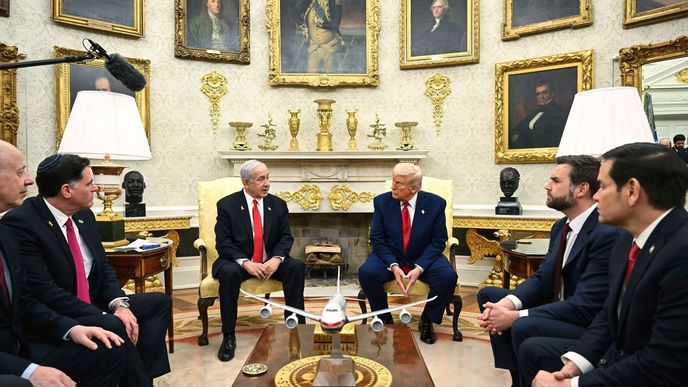Trump Nixed Israeli Plan to Bomb Iran: New York Times Report
“For now,” the Times reported, “Trump has chosen diplomacy over military action.”

WASHINGTON DC, United States (Kurdistan 24) - When Israeli Prime Minister Benjamin Netanyahu visited Washington last week, U.S. President Donald Trump dissuaded him from attacking Iran’s nuclear weapons program, according to a New York Times report published on Wednesday.
Israel had developed plans to attack Iran’s nuclear facilities as soon as next month. However, such an attack would have required U.S. assistance, and as Israeli consultations with Washington began, they triggered a debate within the Trump administration.
The result of that discussion was to postpone any military action in favor of an effort to resolve the issue diplomatically.
“For now,” the Times reported, “Trump has chosen diplomacy over military action.”
That is what Trump told Netanyahu, when he met the Israeli Prime Minister in the Oval Office last week. Those details were not publicly known earlier, but Netanyahu’s unhappiness with his meeting with Trump was evident.
Read More: US, Iran to Hold Nuclear Talks, amid Apparent Disagreement with Israel
Indeed, it was on that occasion that Trump announced that the U.S. would hold direct talks with Iran. The talks were largely indirect, mediated by Oman, but they were significant, and have paused, at least for now, the likelihood of any major military strike.
As it happens, the position of the Kurdistan Regional Government (KRG) is similar. Iran’s Deputy Foreign Minister Saeed Khatibzadeh visited Erbil on Wednesday and met with the KRG Prime Minister, Masrour Barzani.
Both sides stressed the importance of avoiding conflict. “Diplomacy remains the best path to fostering coexistence and resolving disputes,” Barzani said.
Read More: Kurdistan Region PM Receives Iran’s Deputy Foreign Minister
How Trump Came to Favor Diplomacy
The Israeli push to bomb Iran, in concert with the U.S., was driven not only by growing concerns about Iran’s nuclear program, but also a sense of Iran’s weakness, as the Times explained, which was created by a series of events last year.
Iran tried to attack Israel in April 2024, but most of its ballistic missiles were shot down by U.S. or Israeli air defenses.
Hizbollah joined Hamas in attacking Israel, after Hamas’s brutal cross-border assault. Israel’s response eft the Lebanese terrorist group “decimated,” the Times explained.
Then the collapse, in December 2024, of the Assad regime “eliminated a Hizbollah and Tehran ally and cut off a prime route of weapons smuggling from Iran,” it continued.
In addition, “air defense systems in Iran and Syria were also destroyed, along with the facilities that Iran uses to make missile fuel, crippling the country’s ability to produce new missiles for some time,” the Times added.
To the Israelis, this seemed like an opportune time to forcefully eliminate Iran’s nuclear weapons program.
But as the Trump administration came to consider the Israeli idea, divisions emerged. The head of CENTCOM, Gen. Michael Kurilla, and Trump’s National Security Adviser, Michael Waltz, were initially open to the idea, as was Trump himself.
But Tulsi Gabbard, Trump’s Director of National Intelligence, “presented a new intelligence assessment that the build up of American weaponry could potentially spark a wider conflict with Iran that the United States did not want,” the Times said.
Gabbard, a Congresswoman from Hawaii, before becoming head of U.S. intelligence, had been a lieutenant colonel in the Hawaii Army National Guard. She served in Iraq from 2003 to 2005, the first two years of Operation Iraqi Freedom (OIF), the U.S.-led war that overthrew Saddam Hussein and his regime.
Elected to Congress in 2013, Gabbard served on the House Armed Services Committee, including its Subcommittee on Intelligence.
Once Gabbard expressed the view of the intelligence community, she was joined by Susie Wiles, the White House Chief of Staff, Vice President J.D. Vance, and Secretary of Defense Pete Hegseth Isome twenty years before, Hegseth had also opposed OIF.)
As that debate took place, Tehran suggested that it was open to holding indirect talks with the U.S. over its nuclear program.
Vance, “with support from others,” argued that Trump “had a unique opportunity to make a deal,” the Times explained, and if the talks failed, Trump could always return to supporting an Israeli attack on Iran.
Kurilla visited Israel during the first days of April and told officials there that “the White House wanted to put the plan to attack the [Iranian] nuclear facility on hold,” the Times said.
On April 3, Netanyahu called Trump, who said that he did not want to discuss plans about Iran over the phone. So Netanyahu quickly arranged a trip to Washington, arriving four days later.
Although Netanyahu’s visit was said to be about tariffs, his focus was Iran, the Times explained. “But while Mr. Netanyahu was still at the White House, Mr. Trump publicly announced the talks with Iran.”
Indeed, the Times’ account of Trump’s decision-making is entirely consistent with what Brig. Gen. Mark Kimmitt (US Army, Retired) just told Kurdistan24.
Kimmitt was Assistant Secretary of State for Political-Military Affairs, under President George W. Bush, from 2008 to 2009. Before that, he was Deputy Assistant Secretary of Defense for the Middle East.
As Kimmitt said on Wednesday, while attending the Sulaimani Forum, “President Trump was proud of not starting a war during his tenure—and I don’t think he plans to start one now either.”
Read More: Mark Kimmitt to Kurdistan24: U.S. Will Not Resort to War if Iran Talks Collapse
